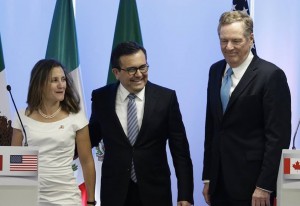
President Donald Trump's success to NAFTA is facing serious trouble with Democrats and Republicans and may not get passed in its current form.
The new trade agreement with Canada and Mexico that President Donald Trump hailed as a major breakthrough back in August appears headed for serious trouble.
Forty Congressional Republicans have stated they will not vote for the agreement because it includes protections for the LGBT community, according to Politico. The protection for the LGBT community was included in the proposed tentative NAFTA 2.0 at the insistence of negotiators from Canada.
The Republicans are the majority party in the U.S. House of Representatives, but campaign means the LGBT section means that the Trump administration cannot pass NAFTA 2.0 without Democratic votes.
However, the Democrats, who will take control of the House of Representatives on Jan. 3, 2019 after a decisive victory on the midterm elections appear to be in no mood to give the President the votes and are calling for additional environmental protections and an overhaul of Mexican labor laws that would make it easier to join an independent union.
(Unions withhold support for new NAFTA approved by Trump. Click Here for the story.)

Getting a deal all three countries could agree to was difficult, passing it by U.S. Dems and Republicans will equally tough.
Mexican workers now often belong to union closely tied to both old-line Mexican political figures and the private sector, opening the door to a system that deliberately holds down wages.
Andres Manuel López Obrador will be installed as Mexico’s new president on Dec. 1, but Lopez Obrador has a clear majority in the new Mexican congress, it’s not clear whether he would push for a complete and complex overhaul of the nation’s labor laws.
The Democrats are making their position clear.
Sander Levin, the Michigan Congressman, who has been one of the Democratic party’s key spokesman on trade policy over the years, said he is opposed to NAFTA 2.0 as it is drafted.
(Click Here for details about why the NAFTA deal faced an uphill battle.)
“I opposed the North American Free Trade Agreement (NAFTA) 25 years ago because it failed to include basic labor and environmental protections, have fought to address these fundamental issues in every subsequent trade agreement, and now am working to ensure any renegotiated NAFTA addresses these critical issues,” he said.
Levin is particularly exercised about the outsourcing of American jobs, believing that by requiring Mexico to end the wage suppression of its workers through the denial of basic labor rights, the playing field will be closer to level.
With the recent release of an agreement between the U.S., Mexico and Canada on revised NAFTA., there must now be active work with Mexico to achieve basic changes in their law and practice as a prerequisite for approval of a renegotiated MAFTA by the U.S. Congress.
“Any agreement must end Mexico’s so-called ‘protection agreements’ entered into with no worker participation or approval and resulting in Mexican workers being paid only $1 and $2 an hour. This structure has denied Mexican workers a path to the middle class and has directly contributed to the loss of jobs and suppression of wages for U.S. Workers, ” Levin said in his note, underscoring Democratic opposition to the agreement without further revision to labor law.
(To see more about the U.S., Mexico agreement on NAFTA’s auto provisions, Click Here.)
Meanwhile, the politics around NAFTA have also shifted. Democrats in Congress provided vital votes for NAFTA 25 years ago but unlikely to do it again.
